
MAIN GROUP CHEMISTRY
Scope & Guideline
Unveiling Innovations in Materials Chemistry
Introduction
Aims and Scopes
- Synthesis and Characterization of Main Group Compounds:
The journal emphasizes the development of new synthetic methods for main group compounds, exploring their structural and functional properties through various characterization techniques. - Applications in Environmental Chemistry:
Research often addresses the application of main group compounds in environmental contexts, such as photocatalysis, wastewater treatment, and sensor development. - Biological and Medicinal Chemistry:
The journal highlights studies on the biological activities of main group compounds, including their potential as antimicrobial agents and anticancer drugs. - Computational Chemistry and Theoretical Studies:
A significant portion of the research involves computational methods to predict properties and behaviors of main group compounds, aiding in the design of new materials and drugs. - Nanomaterials and Advanced Materials:
The journal covers advancements in the synthesis and application of nanomaterials derived from main group elements, focusing on their unique properties and potential uses in technology.
Trending and Emerging
- Photocatalysis and Environmental Remediation:
Recent studies emphasize the use of main group compounds in photocatalytic processes for environmental cleanup, showcasing the growing importance of sustainable chemistry. - In Silico Drug Design and Molecular Docking:
There is an emerging trend in using computational chemistry for drug design, particularly in the context of developing new therapeutic agents against diseases like COVID-19. - Green Chemistry and Sustainable Practices:
Research focusing on environmentally friendly synthesis methods and the application of main group compounds in green chemistry is on the rise, aligning with global sustainability goals. - Nanotechnology in Medicine and Catalysis:
The integration of nanotechnology with main group chemistry for applications in drug delivery systems and catalytic processes is increasingly highlighted in recent publications. - Smart Materials and Responsive Polymers:
There is a growing interest in the development of smart materials, including polymers that respond to environmental stimuli, leveraging the unique properties of main group elements.
Declining or Waning
- Traditional Organic Synthesis:
There has been a noticeable decrease in publications focused solely on traditional organic synthesis methods, as the field has shifted towards more innovative and environmentally friendly approaches. - Basic Coordination Chemistry:
Research centered on fundamental coordination chemistry of main group elements is becoming less prominent, as more emphasis is placed on applications and interdisciplinary studies. - Inorganic Reaction Mechanisms:
The exploration of basic inorganic reaction mechanisms has waned, with fewer studies focusing on the mechanistic aspects of reactions involving main group compounds. - Low-Dimensional Materials:
While still relevant, the specific focus on low-dimensional materials (e.g., 2D materials) derived from main group elements has decreased, possibly due to the rise of more advanced materials research.
Similar Journals

ACTA CHIMICA SLOVENICA
Exploring New Frontiers in Chemical ResearchACTA CHIMICA SLOVENICA is a distinguished peer-reviewed journal dedicated to advancing the field of chemistry, published by the SLOVENSKO KEMIJSKO DRUSTVO. With an ISSN of 1318-0207 and E-ISSN 1580-3155, this journal has been an essential resource for researchers and professionals since its inception in 1996. Recognized for its commitment to open access since 1998, it fosters global collaboration by making research widely available. Based in Slovenia, the journal operates with a focus on various domains within chemistry, achieving a respectable Q3 ranking in 2023 within the miscellaneous chemistry category on Scopus, showcasing its impact and relevance. This journal serves as a vital platform for innovative research, reviews, and discoveries, aiming to enhance knowledge and ignite curiosity in a diverse readership, including students and emerging scholars in the field.
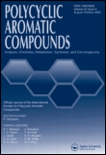
POLYCYCLIC AROMATIC COMPOUNDS
Unraveling the Intricacies of Aromatic StructuresPOLYCYCLIC AROMATIC COMPOUNDS, published by TAYLOR & FRANCIS LTD, is a pivotal journal dedicated to the study of polycyclic aromatic compounds, which play a significant role in fields spanning materials chemistry, organic chemistry, and polymers. With an ISSN of 1040-6638 and an E-ISSN of 1563-5333, this journal features a robust collection of research that informs and guides advancements in understanding the complex interactions and applications of these compounds. Having established its presence since 1990, POLYCYCLIC AROMATIC COMPOUNDS currently holds a Q3 ranking in multiple categories, including Materials Chemistry, Polymers and Plastics, and Organic Chemistry, showcasing its consistent contributions to scientific dialogues. Though traditionally not an open access journal, it provides immense value to researchers, professionals, and students seeking reliable and impactful studies. The journal is located in the United Kingdom at 2-4 PARK SQUARE, MILTON PARK, ABINGDON OR14 4RN, OXON, ENGLAND, and continues to be a trusted source for cutting-edge research in the field.
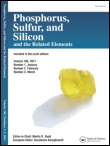
PHOSPHORUS SULFUR AND SILICON AND THE RELATED ELEMENTS
Catalyzing Knowledge in Biochemistry and BeyondPHOSPHORUS SULFUR AND SILICON AND THE RELATED ELEMENTS, published by Taylor & Francis Ltd, is a distinguished journal dedicated to advancing knowledge in the fields of Biochemistry, Inorganic Chemistry, and Organic Chemistry. Established in 1989, the journal has carved a niche in the scientific community by offering a platform for the publication of innovative research that explores the chemistry and applications of phosphorus, sulfur, silicon, and related elements. With an ISSN of 1042-6507 and an E-ISSN of 1563-5325, this journal provides access to valuable insights, albeit without open access options. Despite being positioned in the fourth quartile of its categories (Q4), it remains an essential resource for researchers, professionals, and students seeking to expand their understanding of these pivotal elements and their interactions. With a publishing horizon extending to 2024, the journal invites contributions aimed at pushing the boundaries of chemistry and fostering interdisciplinary dialogue.
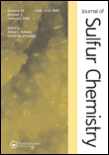
Journal of Sulfur Chemistry
Driving Progress in Sulfur ResearchThe Journal of Sulfur Chemistry, published by Taylor & Francis Ltd, is a pivotal resource dedicated to the field of sulfur chemistry, offering a unique platform for researchers, professionals, and students alike to explore innovative discoveries and advancements. With an ISSN of 1741-5993 and an E-ISSN of 1741-6000, this journal has been a prominent contributor to the academic discourse since its inception in 2004, converging knowledge and research through the year 2024. Recognized in the 2023 Scopus rankings, it holds a strong position at Q3 in the category of miscellaneous chemistry, ranking #173 out of 408, within the 57th percentile, underscoring its role as a valuable asset in the chemistry community. Although the journal does not currently offer open access, it remains a vital source for novel insights and scholarly articles, significantly impacting ongoing research and education in sulfur chemistry.
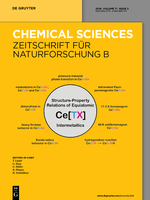
ZEITSCHRIFT FUR NATURFORSCHUNG SECTION B-A JOURNAL OF CHEMICAL SCIENCES
Your Gateway to Cutting-Edge Chemical DiscoveriesZEITSCHRIFT FUR NATURFORSCHUNG SECTION B-A JOURNAL OF CHEMICAL SCIENCES is a distinguished scholarly journal published by Walter de Gruyter GmbH, based in Berlin, Germany. Since its inception in 1947, this journal has served as a vital platform for the dissemination of innovative research and findings in the field of chemical sciences. With an ISSN of 0932-0776 and E-ISSN of 1865-7117, it is indexed in prominent databases, reinforcing its credibility and accessibility for researchers and professionals alike. Currently categorized in the third quartile (Q3) in the field of miscellaneous chemistry according to 2023 assessments, it holds a significant position in the landscape of chemical research, ranking 270th out of 408 in general chemistry with a percentile standing of 33%. Although not an Open Access publication, its rigorous peer-review process ensures the publication of high-quality articles that contribute to advancing knowledge and innovation in chemistry. The journal’s commitment to scientific excellence makes it an essential resource for students and professionals seeking to stay updated with the latest developments in chemical sciences.

Heterocyclic Letters
Pioneering Discoveries in Medicinal and Agricultural ChemistryHeterocyclic Letters is an esteemed journal in the field of synthetic organic chemistry, published by RAMAN PUBL. With ISSN 2231-3087 and E-ISSN 2230-9632, this journal aims to disseminate original research and innovative findings related to heterocyclic compounds, which play a crucial role in medicinal chemistry, material science, and agricultural chemistry. Heterocyclic Letters provides a platform for researchers, professionals, and students to share their insights and advancements, thus fostering academic collaboration and knowledge transfer. The journal is dedicated to maintaining high-quality standards in research publication, making it an essential resource for anyone focused on the latest developments in heterocyclic chemistry. Although it does not currently offer Open Access options, the journal’s rigorous peer-review process ensures that only the most credible and impactful studies are published, contributing significantly to the advancement of the field.

Results in Chemistry
Exploring the Depths of Interdisciplinary ChemistryResults in Chemistry is a prominent journal published by Elsevier, dedicated to fostering innovation and disseminating cutting-edge research in the field of chemistry. With an ISSN of 2211-7156, this open-access journal has been committed to making scientific knowledge widely available since 2019, aligning with the global trend towards accessibility in research. Based in the Netherlands, it features interdisciplinary studies that span the breadth of general chemistry, contributing significantly to the academic dialogue within the scientific community. Despite currently holding a Q3 ranking in the miscellaneous category of chemistry and occupying the 228th position out of 408 in Scopus rankings, the journal is poised for growth, aiming to enhance its impact and visibility. Researchers, professionals, and students alike will find invaluable resources and insights within its pages, making Results in Chemistry an essential platform for those looking to stay abreast of advancements and trends in chemistry research up to the year 2024.

Journal of the Mexican Chemical Society
Catalyzing Collaboration in the Global Chemical CommunityWelcome to the Journal of the Mexican Chemical Society, an essential publication for researchers and professionals in the field of chemistry. Published by the reputable SOC QUIMICA MEXICO, this journal has been a vital platform for sharing innovative research and developments in the field since its inception in 2008. With an ISSN of 1870-249X and an E-ISSN of 1665-9686, the journal provides valuable insights and contributes to the global scientific community. As of 2023, it holds a Q3 quartile ranking in miscellaneous chemistry categories and ranks #258 out of 408 in General Chemistry on Scopus, placing it at the 36th percentile among its peers. Although currently not an open access journal, it remains committed to disseminating high-quality research that supports advancements in chemical education, practice, and technology. Researchers, academics, and students are encouraged to engage with this journal to explore groundbreaking studies and enhance their understanding of diverse chemical disciplines.
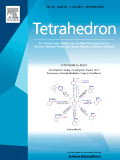
TETRAHEDRON
Transforming ideas into impactful scientific discoveries.TETRAHEDRON, published by Pergamon-Elsevier Science Ltd, is a leading peer-reviewed journal that has been pivotal in advancing the fields of Biochemistry, Drug Discovery, and Organic Chemistry since its inception in 1957. With an ISSN of 0040-4020 and an E-ISSN of 1464-5416, this journal provides a platform for the dissemination of cutting-edge research and innovative methodologies that contribute significantly to the scientific community. Recognized for its rigorous editorial standards, TETRAHEDRON has been categorized in the Q3 quartile for 2023 across its relevant fields, reflecting its solid impact within the scientific sphere. Despite the current absence of Open Access options, the journal continues to engage a diverse readership, offering invaluable insights and advancements that fuel both academic and industrial applications. With an ongoing commitment to excellence, TETRAHEDRON remains an essential resource for researchers, professionals, and students aiming to stay at the forefront of chemistry and biochemistry research.
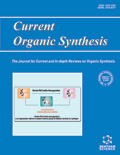
CURRENT ORGANIC SYNTHESIS
Transforming Ideas into Organic SolutionsCURRENT ORGANIC SYNTHESIS, published by Bentham Science Publishers Ltd, is a leading journal in the field of organic chemistry and biochemistry that serves as a vital platform for researchers and professionals advancing the synthesis of organic compounds. With an ISSN of 1570-1794 and an E-ISSN of 1875-6271, it boasts a significant impact within its category, ranked in the Q3 quartile for both biochemistry and organic chemistry as of 2023. The journal covers innovative research and reviews that enhance our understanding of organic synthesis methodologies, showcasing contributions that advance the field. Operating from Sharjah, United Arab Emirates, CURRENT ORGANIC SYNTHESIS has evolved since its inception in 2005, providing access to a wealth of information essential for students, professionals, and researchers alike. While it currently does not offer open access, the journal continues to maintain a strong community of scholars dedicated to fostering dialogue and innovation in the organic sciences.